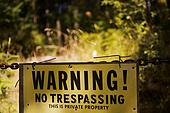
Do the words hostile, notorious, open, exclusive and continuous mean anything to you? They do if you have ever had your property taken by a trespasser who squatted on your property long enough to acquire title to it. The term is called "adverse possession" and it is one of the oldest forms of legal theft in the United States. One common scenario goes like this:
Adverse Possession Scenario
You and your neighbor own separate 10 acre parcels that share a common border. One day your neighbor puts up a fence to divide his property from yours. Without measuring the property line, your neighbor installs the fence just barely on your side of the line. Not wanting to be a bad neighbor, you don't say anything to him about the fence being on your property. Years later your neighbor parks his boat on your side of the fence so that it can't been seen from his driveway. You don't mind because you aren't using that part of your property anyway and really can't even see the boat from where your house is located. You just wish he would have asked you first. Twenty years go by and your neighbor has made a habit of storing things on your property. He decides to sell his property. He has his property surveyed and finally realizes that he has been storing his things on your property for the past twenty years. Instead of being the good neighbor you have always tried to be, he instead files court papers to obtain your property through adverse possession instead of a deed. The kicker, he wins.
What Is Adverse Possession?
A trespasser is entitled to legal ownership of property if his occupation of the property is hostile, actual, open and notorious, exclusive and continuous for a period of years set by state statute. These terms take on a different meaning under the law than the meanings we normally attribute to them. For example, the word "hostile" does not mean that the trespasser has built a fort on your property and armed himself for battle. Most courts follow one of two legal definitions of hostile. The definition followed by most states is called the "Connecticut Rule" which defines hostile simply as occupation of the land. The trespasser doesn't have to know that the land belongs to someone else. The other rule, called the "Maine Rule," requires that the person merely be aware that he is trespassing.
The length of time before a trespasser may apply for quiet title depends on the state and is usually around twenty years.
Protect Yourself; Try A Real Estate Attorney
If you are concerned that someone may claim an interest in your property there are several things you can do to protect yourself. First, check your property tax records. If someone has paid taxes on your property they may be preparing to take your property through adverse possession.
Second, do not let the person enter onto your property. Block entry ways and call the sheriff if you have to.
Third, if the person is a friendly neighbor give the person written permission to use the property. If your neighbor puts a fence on your property notify him and give him written permission to keep his fence on your property. Keep a copy of the letter granting permission. A simple letter will allow you to avoid losing your property to adverse possession.
If you question whether you can handle any of the above actions, contact a real estate attorney. A real estate attorney can determine whether an adverse possession claim exists and can file any paperwork (i.e. eviction, etc.) necessary to block the claim.